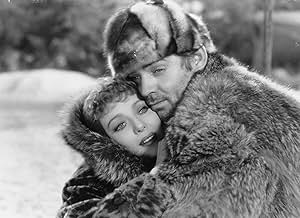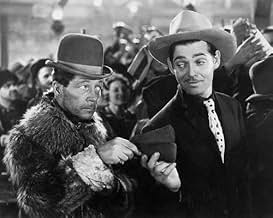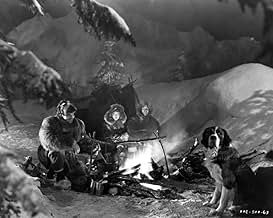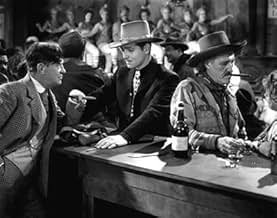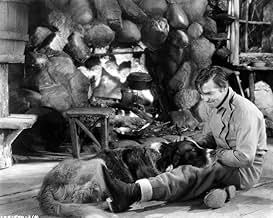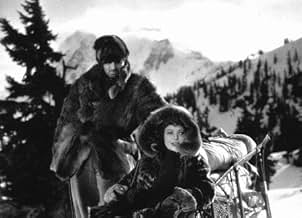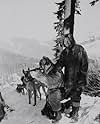IMDb-BEWERTUNG
6,8/10
2760
IHRE BEWERTUNG
Während des Klondike-Goldrausches kauft ein Reisender einen Hund, der ihm den Weg zum Schatz weist, überlegt aber seine Reise noch einmal, als er eine sitzen gelassene verheiratete Frau find... Alles lesenWährend des Klondike-Goldrausches kauft ein Reisender einen Hund, der ihm den Weg zum Schatz weist, überlegt aber seine Reise noch einmal, als er eine sitzen gelassene verheiratete Frau findet.Während des Klondike-Goldrausches kauft ein Reisender einen Hund, der ihm den Weg zum Schatz weist, überlegt aber seine Reise noch einmal, als er eine sitzen gelassene verheiratete Frau findet.
- Regie
- Drehbuch
- Hauptbesetzung
- Auszeichnungen
- 1 wins total
Thomas E. Jackson
- 'Tex' Rickard
- (as Tommy Jackson)
George MacQuarrie
- Mounted Policeman
- (as George McQuarrie)
C.E. Anderson
- Fourth Poker Player
- (Nicht genannt)
Edwin Argus
- Dawson Townsman
- (Nicht genannt)
William Arnold
- First Faro Player
- (Nicht genannt)
Empfohlene Bewertungen
Jack London's novel The Call Of The Wild is pretty much ignored in this 1935 adaptation. The title remains the same and there IS a dog named Buck involved in parts of the action, but apart from that the similarities are virtually non-existent. Far greater emphasis is placed on the human characters in the film than in the book. One has to assume that the film was written as a vehicle for Clark Gable, a big outdoor adventure yarn in which the star could get in to and out of a variety of hair-raising escapades in the frozen wilderness. The fact that London's novel is essentially an animal story with a few human characters passing through the narrative is of little significance to scripter Gene Fowler and director William Wellman. That's not to say The Call Of The Wild is a disposable film; the unusual and expensive decision to film on genuinely cold, mountainous locations (Washington state standing in for Yukon) shows that this was envisaged as a serious box office winner.
Struggling gold prospector Jack Thornton (Gable) and his goofy sidekick Shorty Hooliham (Jack Oakie) travel around the Yukon in the 19th Century, searching for an elusive gold strike that will make them richer than rich. They are helped in their adventures by a St Bernard dog named Buck. Also busily scouring the land for gold is the sinister English-man Smith (Reginald Owen), a cruel rival who has a mysterious past and even a little history with Thornton's dog. During their wanderings, Jack and Shorty come across a woman called Claire Blake (Loretta Young) whose husband has gone missing in the snowfields and could be dead. Claire teams up with Jack, Shorty and Buck, but it isn't long before she finds herself falling for Thornton's roguish charm, even though she cannot be sure if her husband is dead or alive.
The movie is very enjoyable in its old-fashioned way. I'm a believer in the theory that films should try to be faithful to their source material, at least to a reasonable extent, so in some ways I felt dismayed at the lack of respect towards London's original story. However, once I'd got that small irritation out of my system I found The Call Of The Wild a perfectly likable star vehicle. Gable is solid in a role that asks little of him other than to appear rugged and fearless. Owen is very good as the villain of the piece, while Young shares a good chemistry with the hero (in real-life, she and Gable were lovers). Jack Oakie is the least impressive of the key actors, mugging rather embarrassingly as the inevitable comical sidekick. The location work in Washington state adds a sense of authenticity to the film that is very uncommon for a movie made in the studio-bound '30s. On the negative side, though, the film settles for a very convenient ending which ditches plausibility so that the course of true love and personal success can run smoothly (indeed, IMPROBABLY smoothly) for the main protagonists. Of its type and era, however, The Call Of The Wild is watchable and entertaining fare.
Struggling gold prospector Jack Thornton (Gable) and his goofy sidekick Shorty Hooliham (Jack Oakie) travel around the Yukon in the 19th Century, searching for an elusive gold strike that will make them richer than rich. They are helped in their adventures by a St Bernard dog named Buck. Also busily scouring the land for gold is the sinister English-man Smith (Reginald Owen), a cruel rival who has a mysterious past and even a little history with Thornton's dog. During their wanderings, Jack and Shorty come across a woman called Claire Blake (Loretta Young) whose husband has gone missing in the snowfields and could be dead. Claire teams up with Jack, Shorty and Buck, but it isn't long before she finds herself falling for Thornton's roguish charm, even though she cannot be sure if her husband is dead or alive.
The movie is very enjoyable in its old-fashioned way. I'm a believer in the theory that films should try to be faithful to their source material, at least to a reasonable extent, so in some ways I felt dismayed at the lack of respect towards London's original story. However, once I'd got that small irritation out of my system I found The Call Of The Wild a perfectly likable star vehicle. Gable is solid in a role that asks little of him other than to appear rugged and fearless. Owen is very good as the villain of the piece, while Young shares a good chemistry with the hero (in real-life, she and Gable were lovers). Jack Oakie is the least impressive of the key actors, mugging rather embarrassingly as the inevitable comical sidekick. The location work in Washington state adds a sense of authenticity to the film that is very uncommon for a movie made in the studio-bound '30s. On the negative side, though, the film settles for a very convenient ending which ditches plausibility so that the course of true love and personal success can run smoothly (indeed, IMPROBABLY smoothly) for the main protagonists. Of its type and era, however, The Call Of The Wild is watchable and entertaining fare.
If you are a lover of Jack London's CALL OF THE WILD, then you probably should skip this film, as it takes a lot of liberties with the book. In many ways, the original story is really forgotten and it's only a very rough approximation of the book. So, as a rendition of the original it stinks. BUT, if you ignore the book and just watch it for the fun of it and let go of your preconceptions, it's a wonderful film for anyone except Literature teachers.
Clark Gable is at his best and Loretta Young is absolutely beautiful in the film. While I never thought she was one of the prettiest actresses, the cinematographer really did his work and make her look radiant (I mean that in a good way--not in the CHARLOTTE'S WEB way). Jack Okie is fine as the loyal friend and the movie strongly concentrates on people and not the dog--now that's an interesting choice, huh? Overall, one of the better adventure films of the era and well worth watching.
Clark Gable is at his best and Loretta Young is absolutely beautiful in the film. While I never thought she was one of the prettiest actresses, the cinematographer really did his work and make her look radiant (I mean that in a good way--not in the CHARLOTTE'S WEB way). Jack Okie is fine as the loyal friend and the movie strongly concentrates on people and not the dog--now that's an interesting choice, huh? Overall, one of the better adventure films of the era and well worth watching.
THE CALL OF THE WILD (20th Century Pictures, 1935), directed by William A. Wellman, released at the time when classic literature becomes classic cinema, ranks one of the finer Jack London based stories transferred to the screen in spite the fact that it's actually a free adaptation to his classic 1903 novel. In true Hollywood tradition, this version plays like a matinée western, handsome hero, comic sidekick, pretty heroine and nasty villain. Instead of a horse, there's a tough St. Bernard by the name of Buck, who, unlike the novel, is a secondary character, leaving much of the story to its hero, Jack Thornton.
Opening title: "Yukon, 1900, Skagway - mushroom metropolis, the first stop on the long trail to the gold fields." After gambling away his fortune at the gambling tables of The Great Northern where people gather together for wine, liquor and cigars, Jack Thornton (Clark Gable) meets up with his old pal, "Shorty" Houlihan (Jack Oakie). Having served a six month jail sentence for opening another man's letter containing a map to a gold mine compiled by the late Martin Blake, Shorty, who copied the map by memory after destroying the original, invites Thornton to accompany him in the search. Along the way, Thornton acquires vicious St. Bernard named Buck from Joe Groggins (Sidney Toler), saving the animal from being shot by the demanding Mr. Smith (Reginald Owen), whom the dog despises; and Claire (Loretta Young), of San Francisco, camping alone in the woods surrounded by wolves, who happens to be the wife of John Blake, son of the late gold prospector. Blake, who's been missing for a week, is believed to be dead. Not wanting to leave the Blake woman alone in the wild, Thornton takes her with them. Together they form a partnership searching for gold while Blake (Frank Conroy), very much alive, having fallen victim to Smith and his murderous assistants (Charles Stevens and Lalos Encinas) out to get the claim for themselves.
With THE CALL OF THE WILD having been screened earlier by Pathe (1923) with Jack Mulhall; adapted again in 1972 starring Charlton Heston, and a several more in later years, it's the Gable version that's remembered best. Gable, on loan from his home studio of MGM, makes one of the finer Jack London heroes, forceful and confident; and perfect Hollywood leading man by the way of romance. Buck, having little to do plot-wise, serves the film's purpose with a key scene in the Dawson City sequence where he pulls a thousand pound load sled through the cheering crowd of spectators a hundred yards on slippery snow towards his calling master as part of a $1,000 bet Thornton made with Smith. Aside from fine chemistry between Gable and Young (who worked together again in the 1950 MGM comedy, KEY TO THE CITY), Buck has his call of the wild with a female dog companion as well.
Anyone reading the closing cast credits will notice that Katherine DeMille, listed for the role of Marie, is non-existent in the final print. According to Bob Dorian, former host of American Movie Classics, during one of its many broadcasts during the 1990s, mentioned that DeMille's scenes were cut after its initial premiere due to her questionable character, reducing its original 95 minute length to 81, where it has been since. It's believed her character appeared during the latter portion of the opening saloon sequence, prior to Thornton's purchase of Buck, which explains the immediate cut from one scene to another. As it stands now, no prints involving "Marie" exists today. What has survived, according to an episode of the 1970s TV documentary, "That's Hollywood," narrated by Tom Bosley, is a cut scene involving Smith's shooting Shorty over a gambling debt. Because audiences couldn't accept comedian Jack Oakie getting killed, it was cut with Oakie's scenes rewritten. Unlike most movies at that time, filmed mostly inside the studio set, THE CALL OF THE WILD ads touches of realism with its location shooting in the Washington State mountains. Rumor has it that freezing temperatures caused production delays. Overall, THE CALL OF THE WILD is best noted for the off-screen romance chemistry between Gable and Young, as profiled during A&E's "Biography" on either Gable or Young.
Of all the Gable movies placed on VHS and DVD, it's a wonder why THE CALL OF THE WILD was never distributed on home video, considering its popularity due to frequent commercial TV revivals in the 1960s, 70s and 80s, unlike the now forgotten WHITE FANG (20th-1936), another Jack London based story transferred to the screen. Starring Michael Whalen and Jean Muir, it's opening titles read "A sequel to "The Call of the Wild." Aside from the title character being an offspring of Buck, and no sign of Clark Gable's Jack Thornton, there is a villain in the story named "Beauty" Smith, as portrayed by John Carradine, but not the same Smith wonderfully portrayed by Owen. Besides its former broadcasts on American Movie Classics prior to 2005, THE CALL OF THE WILD has also appeared on the Fox Movie Channel and Turner Classic Movies (TCM premiere: November 7, 2012)(***)
Opening title: "Yukon, 1900, Skagway - mushroom metropolis, the first stop on the long trail to the gold fields." After gambling away his fortune at the gambling tables of The Great Northern where people gather together for wine, liquor and cigars, Jack Thornton (Clark Gable) meets up with his old pal, "Shorty" Houlihan (Jack Oakie). Having served a six month jail sentence for opening another man's letter containing a map to a gold mine compiled by the late Martin Blake, Shorty, who copied the map by memory after destroying the original, invites Thornton to accompany him in the search. Along the way, Thornton acquires vicious St. Bernard named Buck from Joe Groggins (Sidney Toler), saving the animal from being shot by the demanding Mr. Smith (Reginald Owen), whom the dog despises; and Claire (Loretta Young), of San Francisco, camping alone in the woods surrounded by wolves, who happens to be the wife of John Blake, son of the late gold prospector. Blake, who's been missing for a week, is believed to be dead. Not wanting to leave the Blake woman alone in the wild, Thornton takes her with them. Together they form a partnership searching for gold while Blake (Frank Conroy), very much alive, having fallen victim to Smith and his murderous assistants (Charles Stevens and Lalos Encinas) out to get the claim for themselves.
With THE CALL OF THE WILD having been screened earlier by Pathe (1923) with Jack Mulhall; adapted again in 1972 starring Charlton Heston, and a several more in later years, it's the Gable version that's remembered best. Gable, on loan from his home studio of MGM, makes one of the finer Jack London heroes, forceful and confident; and perfect Hollywood leading man by the way of romance. Buck, having little to do plot-wise, serves the film's purpose with a key scene in the Dawson City sequence where he pulls a thousand pound load sled through the cheering crowd of spectators a hundred yards on slippery snow towards his calling master as part of a $1,000 bet Thornton made with Smith. Aside from fine chemistry between Gable and Young (who worked together again in the 1950 MGM comedy, KEY TO THE CITY), Buck has his call of the wild with a female dog companion as well.
Anyone reading the closing cast credits will notice that Katherine DeMille, listed for the role of Marie, is non-existent in the final print. According to Bob Dorian, former host of American Movie Classics, during one of its many broadcasts during the 1990s, mentioned that DeMille's scenes were cut after its initial premiere due to her questionable character, reducing its original 95 minute length to 81, where it has been since. It's believed her character appeared during the latter portion of the opening saloon sequence, prior to Thornton's purchase of Buck, which explains the immediate cut from one scene to another. As it stands now, no prints involving "Marie" exists today. What has survived, according to an episode of the 1970s TV documentary, "That's Hollywood," narrated by Tom Bosley, is a cut scene involving Smith's shooting Shorty over a gambling debt. Because audiences couldn't accept comedian Jack Oakie getting killed, it was cut with Oakie's scenes rewritten. Unlike most movies at that time, filmed mostly inside the studio set, THE CALL OF THE WILD ads touches of realism with its location shooting in the Washington State mountains. Rumor has it that freezing temperatures caused production delays. Overall, THE CALL OF THE WILD is best noted for the off-screen romance chemistry between Gable and Young, as profiled during A&E's "Biography" on either Gable or Young.
Of all the Gable movies placed on VHS and DVD, it's a wonder why THE CALL OF THE WILD was never distributed on home video, considering its popularity due to frequent commercial TV revivals in the 1960s, 70s and 80s, unlike the now forgotten WHITE FANG (20th-1936), another Jack London based story transferred to the screen. Starring Michael Whalen and Jean Muir, it's opening titles read "A sequel to "The Call of the Wild." Aside from the title character being an offspring of Buck, and no sign of Clark Gable's Jack Thornton, there is a villain in the story named "Beauty" Smith, as portrayed by John Carradine, but not the same Smith wonderfully portrayed by Owen. Besides its former broadcasts on American Movie Classics prior to 2005, THE CALL OF THE WILD has also appeared on the Fox Movie Channel and Turner Classic Movies (TCM premiere: November 7, 2012)(***)
This is my first exposure to anything regarding THE CALL OF THE WILD. Meaning that I haven't read Jack London's original novel, never saw any of the earlier film versions, and did not see any of the later remakes. Even as a Charlton Heston fan I've so far avoided his 1972 edition because it's said to be pretty bad; even Heston begged his fans not to see it! But all that may soon change, as I enjoyed the 1935 version, starring Clark Gable and Loretta Young.
Gable is well cast as Jack Thornton, a rugged and adventurous type who travels the Yukon on a hunt for gold with the aid of his comical sidekick Shorty (Jack Oakie) and man's best friend, Buck the dog. In the midst of their quest they stumble upon a shaken woman (Young) whose husband has disappeared in the wilderness and may or may not be dead. Fearing the worst, Young joins the expedition and the expected romance with Gable gradually takes shape.
For me, one of the highlights of the picture was British actor Reginald Owen who scores high with his portrayal of a nasty rich man who's also competing with Gable for the loot. Never short on snobbish insults, and harboring a personal vendetta against Thornton's dog Buck, Owen is a delight in every scene he's in. The same cannot necessarily be said for Jack Oakie, however... as Shorty, his goofy shenanigans sometimes verge on the overbearing.
A nice mixture of adventure, villainy, romance, and some comedy that occasionally works, makes for a mostly good time. I was a little let down by the convenient ending. *** out of ****
Gable is well cast as Jack Thornton, a rugged and adventurous type who travels the Yukon on a hunt for gold with the aid of his comical sidekick Shorty (Jack Oakie) and man's best friend, Buck the dog. In the midst of their quest they stumble upon a shaken woman (Young) whose husband has disappeared in the wilderness and may or may not be dead. Fearing the worst, Young joins the expedition and the expected romance with Gable gradually takes shape.
For me, one of the highlights of the picture was British actor Reginald Owen who scores high with his portrayal of a nasty rich man who's also competing with Gable for the loot. Never short on snobbish insults, and harboring a personal vendetta against Thornton's dog Buck, Owen is a delight in every scene he's in. The same cannot necessarily be said for Jack Oakie, however... as Shorty, his goofy shenanigans sometimes verge on the overbearing.
A nice mixture of adventure, villainy, romance, and some comedy that occasionally works, makes for a mostly good time. I was a little let down by the convenient ending. *** out of ****
The Yukon Gold Rush: A savage dog and a lonely man each respond to THE CALL OF THE WILD, that primordial release of primitive urges, in their own way.
It should be understood immediately that this movie only borrows the title and a few incidents from Jack London's classic novel. And at that point the comparison between the two should end. This film, rousing & adventurous, is able to stand on its own merits. An excellent cast, fine production values (notice particularly the care with which Skagway & Dawson are depicted) and location shooting in Washington State are the film's strongest assets. The plot, meant solely for entertainment, is pure hokum...
Clark Gable brings his trademark masculinity to a role that didn't require a lot of stretching of his thespian muscles. But in essentially playing himself he is perfectly cast. One cannot overcome the suspicion that London's original story was reworked for the star. Gable had been through this before - remote setting, forces of nature, beautiful woman, adultery. Think RED DUST in the snow.
Loretta Young is the beautiful woman. From scene to scene, no matter what the hardship, she remains living proof that a first class Hollywood makeup job can withstand the worst ravages of the Klondike. This is perhaps too harsh. Like Gable, little more is required of her than to exude physicality. She is indeed a treat to the eyes, even if her inclusion in the plot is patently ludicrous. (The on screen attraction between Gable & Young wasn't faked. A daughter, ostensibly 'adopted' by Young in France, would be the result.)
As Gable's sidekick, comic Jack Oakie has one of his best screen roles. Getting to play most of his scenes strictly for laughs, he adds chuckles to the story which, one assumes, would have outraged London.
Twisting his usual pomposity to a sinister bent, English character actor Reginald Owen is memorable as the film's villain. Dangerously wicked, he makes us want to know more about this man called Smith, with money to burn and a raging temper. The screenplay, wisely, leaves his biography up to the imagination of the viewer.
Sidney Toler & Herman Bing are very good in small roles. Movie mavens will recognize Arthur Housman, veteran of many Laurel & Hardy comedy shorts, as a Skagway drunk with a surprisingly mean punch.
The affection between Gable and Buck, the great St. Bernard with whom he shares so many scenes, is obvious.
It should be understood immediately that this movie only borrows the title and a few incidents from Jack London's classic novel. And at that point the comparison between the two should end. This film, rousing & adventurous, is able to stand on its own merits. An excellent cast, fine production values (notice particularly the care with which Skagway & Dawson are depicted) and location shooting in Washington State are the film's strongest assets. The plot, meant solely for entertainment, is pure hokum...
Clark Gable brings his trademark masculinity to a role that didn't require a lot of stretching of his thespian muscles. But in essentially playing himself he is perfectly cast. One cannot overcome the suspicion that London's original story was reworked for the star. Gable had been through this before - remote setting, forces of nature, beautiful woman, adultery. Think RED DUST in the snow.
Loretta Young is the beautiful woman. From scene to scene, no matter what the hardship, she remains living proof that a first class Hollywood makeup job can withstand the worst ravages of the Klondike. This is perhaps too harsh. Like Gable, little more is required of her than to exude physicality. She is indeed a treat to the eyes, even if her inclusion in the plot is patently ludicrous. (The on screen attraction between Gable & Young wasn't faked. A daughter, ostensibly 'adopted' by Young in France, would be the result.)
As Gable's sidekick, comic Jack Oakie has one of his best screen roles. Getting to play most of his scenes strictly for laughs, he adds chuckles to the story which, one assumes, would have outraged London.
Twisting his usual pomposity to a sinister bent, English character actor Reginald Owen is memorable as the film's villain. Dangerously wicked, he makes us want to know more about this man called Smith, with money to burn and a raging temper. The screenplay, wisely, leaves his biography up to the imagination of the viewer.
Sidney Toler & Herman Bing are very good in small roles. Movie mavens will recognize Arthur Housman, veteran of many Laurel & Hardy comedy shorts, as a Skagway drunk with a surprisingly mean punch.
The affection between Gable and Buck, the great St. Bernard with whom he shares so many scenes, is obvious.
Wusstest du schon
- WissenswertesLike many films of the era, this production was originally slated to film in the Southern Sierra Nevada near Sonora. In fact, production had already begun when a warm front melted the snow and forced a hasty and expensive move to Washington state.
- PatzerWhy call this a goof? It's just a funny way of saying he'd knife someone.
- Zitate
Jack Thornton: Me? I'll take bourbon. It kills you slower, but a lot more pleasant like.
- Alternative VersionenOriginally released at 95 minutes; later cut to 81 minutes for a re-issue. For many years only the cut re-issue version was available for television showings, and it is also the version released on DVD in 2006 as part of the Clark Gable Collection. The original length version remained unseen until it was released on blu-ray in 2013.
- VerbindungenFeatured in Mama, ich und wir zwei (1991)
Top-Auswahl
Melde dich zum Bewerten an und greife auf die Watchlist für personalisierte Empfehlungen zu.
- How long is Call of the Wild?Powered by Alexa
Details
- Laufzeit
- 1 Std. 29 Min.(89 min)
- Farbe
- Sound-Mix
- Seitenverhältnis
- 1.37 : 1
Zu dieser Seite beitragen
Bearbeitung vorschlagen oder fehlenden Inhalt hinzufügen


